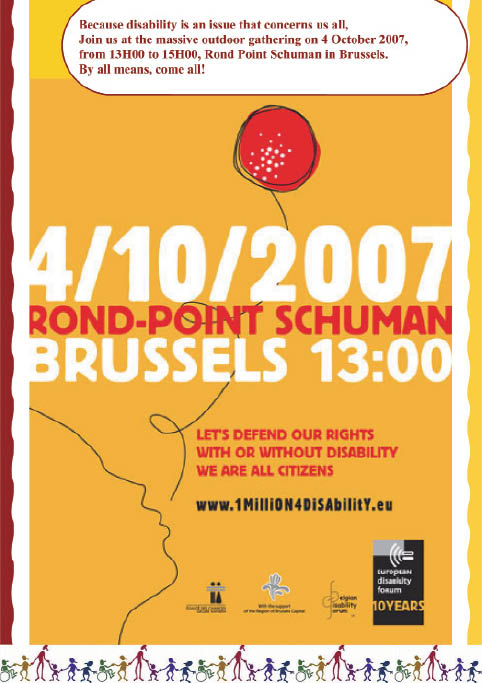|
After a
first informal announcement which presented the specific directive to combat
discrimination on the grounds of disability, the European Commission stepped
back and decided to present the proposal for a cross-cutting directive
establishing a general framework for equal treatment prohibiting any
discrimination not only on the grounds of disability, but religion or belief,
age or sexual orientation. As a matter of fact, from the moment the
Commission was accepting the request from the disability movement culminating
with "1 million 4 disability", which gathered 1,300,000 signatures, a lot of pressure from
parliamentary groups of liberal and socialist Europeans, and a few
Commissioners, succeeded in negatively orientating, by a handful of votes,
the position of the European Parliament.
The Commission had also planned to present two different directive proposals,
but the option to grant all motives of possible discrimination in a single proposal was passed because of the firm belief that it would be easier to receive assent for the more controversial aspects like religion and faith and
sexual orientation. The proposal was therefore presented by
the Commissioners' College last July 2nd.
The European Disability Forum immediately took position, commenting the
proposal with much criticism. The passed document is decidedly poor and the
provisions regarding the area of disability are concentrated in a single
article (4).
In terms of content, the proposed directive presents severe limitations, most
of all in regards to the right of access to education and specific financial services,
particularly insurance.
There is also great confusion between the principle of "reasonable accommodation" and the one relating to the
preventive adoption of measures allowing persons with disabilities effective
access to protection
and social services, education and access to goods and services available
to the population, entailing a fundamental limitation to the principle of
accessibility. There
comes also heavily into play the principle of "disproportionate
burden" maybe rendering fruitless the actual enjoyment of numerous
rights. The proposal seems without a doubt a retrogression in regards to the
more advanced legislation of some state members, in particular on the issue
of accessibility, and constitutes a very negative sign
in relation to the application in the European Union of the Convention of the United Nations
on the rights of persons with disabilities.
|
 The reaction of civil society and trade union organizations and
networks was on the contrary rather favourable. The Social Platform, the
trade union organizations and some groups advocating human rights had
positioned themselves in favour of a cross-cutting directive which included
all causes for discrimination contained in Article
13 in the Treaty of the Union. In fact, the directive can be sufficient for organizations
defending the human rights of persons at risk of discrimination for their
sexual orientation. Less favourable, on the contrary, were the reactions of
organizations representing seniors and minority groups based on race,
ethnicity and religion. These groups are working to coordinate their response
to the proposed directive. The European Commission, on its part, considers
that the proposal has a large scope relating to the competence and
limitations sanctioned by Article 13 and is optimistic concerning its quick
assent. The European Parliament will have to come to a decision shortly and
it is predictable that its judgment will be favourable. The European Council,
finally, will be called to take the final decision which could be rather
hard-won. If the actual French Presidency seems to be inclined to
give its assent in the short term, but some state members are still holding up.
Germany would like to reach an eventual adoption only after its national
elections in the fall
of 2009, and the United Kingdom still has reservations about the issue of
discrimination against older adults. Spain is favourable to the adoption, but the majority of countries still seem to be
undecided. France does not express itself, since it has at the present time
the Presidency of Europe, but it does not seem to have the intention to get
deeply committed towards the adoption. What's more, the vagueness of the text
could facilitate its agreement, reducing objections by state members. The reaction of civil society and trade union organizations and
networks was on the contrary rather favourable. The Social Platform, the
trade union organizations and some groups advocating human rights had
positioned themselves in favour of a cross-cutting directive which included
all causes for discrimination contained in Article
13 in the Treaty of the Union. In fact, the directive can be sufficient for organizations
defending the human rights of persons at risk of discrimination for their
sexual orientation. Less favourable, on the contrary, were the reactions of
organizations representing seniors and minority groups based on race,
ethnicity and religion. These groups are working to coordinate their response
to the proposed directive. The European Commission, on its part, considers
that the proposal has a large scope relating to the competence and
limitations sanctioned by Article 13 and is optimistic concerning its quick
assent. The European Parliament will have to come to a decision shortly and
it is predictable that its judgment will be favourable. The European Council,
finally, will be called to take the final decision which could be rather
hard-won. If the actual French Presidency seems to be inclined to
give its assent in the short term, but some state members are still holding up.
Germany would like to reach an eventual adoption only after its national
elections in the fall
of 2009, and the United Kingdom still has reservations about the issue of
discrimination against older adults. Spain is favourable to the adoption, but the majority of countries still seem to be
undecided. France does not express itself, since it has at the present time
the Presidency of Europe, but it does not seem to have the intention to get
deeply committed towards the adoption. What's more, the vagueness of the text
could facilitate its agreement, reducing objections by state members.
The European Disability Forum is studying various strategic options, inclined
finally for the more positive one: attempt to improve the proposal during the
course of its legislative procedure, avoiding the adoption of a conflicting
attitude with European institutions or other organizations representing groups
at risk of discrimination.
The pure and simple rejection of the proposal, though it is coherent with the
statement "1 million 4 disability", could be counterproductive just
like an excessively delaying tactics. The future perspectives are not however
very rosy, and the missed adoption of the actual proposal would not guarantee in any way the presentation of a new text
by the Commission which will be installed in 2009. If on the part of the institutions there is
some opening, the result of the chosen strategy could be partially positive.

|

It could
be possible to work on improving Article 4 and the paragraphs relating
to education and financial services. The reintroduction of the request of
a disability specific directive is not to be excluded, but will not be
possible before 2010.
This
implies a long-term strategy which could be based on the identification
of a new legislative basis. However, even the
attempt in developing an initiative
in the area of accessibility could fail since the atmosphere
is not encouraging. As a matter of fact, it was expected that the Commission
proposed a directive on e-Accessibility, while instead at the moment we are
writing these lines, there is only the perspective of a provision concerning
Web accessibility. On the
other hand, a directive based on the access to goods and services does
not seem particularly adapted to cover the fundamental aspects such as access to education, independent living, etc.
To exit the dead end, a European agreement on disability between state members could be
proposed, but this hypothesis seems unrealistic.
In conclusion, we have to repeat that the cross-cutting
directive proposal passed by the Commission is devoid of any ambition and is
absolutely not in line with the principles of the convention of the United
Nations on the rights of persons with disabilities, nor with the set of rules
on equal treatment and anti-discrimination adopted by many state members. The
area of disability is strongly penalized by not being able to report any
effective and prescriptive progress, while it seems there is an obvious and
disappointing “banalization” of the principles of
the convention. There is a significant restriction of the rights, most of all
in regards to the access to education and the enjoyment of financial services.
The language is imprecise and sometimes contradictory
which leaves space to interpretation. Some of the legislative concepts
introduced are not well defined, their scope not made clear (reasonable
solutions, disproportionate burden, preventive application).
It can be asserted without a doubt that if this directive were to be adopted
in its present form, it would not provide any advantage to persons with
disabilities in Europe, but, on the contrary, it could provide entry to
discriminatory attitudes and behaviours, penalizing strongly persons with
disabilities who are expecting much else from European institutions.
The mountain gave birth to a mouse: a lot of hope was
unfulfilled, but the movement is not giving up. The European elections are
around the corner.
|
 The reaction of civil society and trade union organizations and
networks was on the contrary rather favourable. The Social Platform, the
trade union organizations and some groups advocating human rights had
positioned themselves in favour of a cross-cutting directive which included
all causes for discrimination contained in Article
13 in the Treaty of the Union. In fact, the directive can be sufficient for organizations
defending the human rights of persons at risk of discrimination for their
sexual orientation. Less favourable, on the contrary, were the reactions of
organizations representing seniors and minority groups based on race,
ethnicity and religion. These groups are working to coordinate their response
to the proposed directive. The European Commission, on its part, considers
that the proposal has a large scope relating to the competence and
limitations sanctioned by Article 13 and is optimistic concerning its quick
assent. The European Parliament will have to come to a decision shortly and
it is predictable that its judgment will be favourable. The European Council,
finally, will be called to take the final decision which could be rather
hard-won. If the actual French Presidency seems to be inclined to
give its assent in the short term, but some state members are still holding up.
Germany would like to reach an eventual adoption only after its national
elections in the fall
of 2009, and the United Kingdom still has reservations about the issue of
discrimination against older adults. Spain is favourable to the adoption, but the majority of countries still seem to be
undecided. France does not express itself, since it has at the present time
the Presidency of Europe, but it does not seem to have the intention to get
deeply committed towards the adoption. What's more, the vagueness of the text
could facilitate its agreement, reducing objections by state members.
The reaction of civil society and trade union organizations and
networks was on the contrary rather favourable. The Social Platform, the
trade union organizations and some groups advocating human rights had
positioned themselves in favour of a cross-cutting directive which included
all causes for discrimination contained in Article
13 in the Treaty of the Union. In fact, the directive can be sufficient for organizations
defending the human rights of persons at risk of discrimination for their
sexual orientation. Less favourable, on the contrary, were the reactions of
organizations representing seniors and minority groups based on race,
ethnicity and religion. These groups are working to coordinate their response
to the proposed directive. The European Commission, on its part, considers
that the proposal has a large scope relating to the competence and
limitations sanctioned by Article 13 and is optimistic concerning its quick
assent. The European Parliament will have to come to a decision shortly and
it is predictable that its judgment will be favourable. The European Council,
finally, will be called to take the final decision which could be rather
hard-won. If the actual French Presidency seems to be inclined to
give its assent in the short term, but some state members are still holding up.
Germany would like to reach an eventual adoption only after its national
elections in the fall
of 2009, and the United Kingdom still has reservations about the issue of
discrimination against older adults. Spain is favourable to the adoption, but the majority of countries still seem to be
undecided. France does not express itself, since it has at the present time
the Presidency of Europe, but it does not seem to have the intention to get
deeply committed towards the adoption. What's more, the vagueness of the text
could facilitate its agreement, reducing objections by state members.
